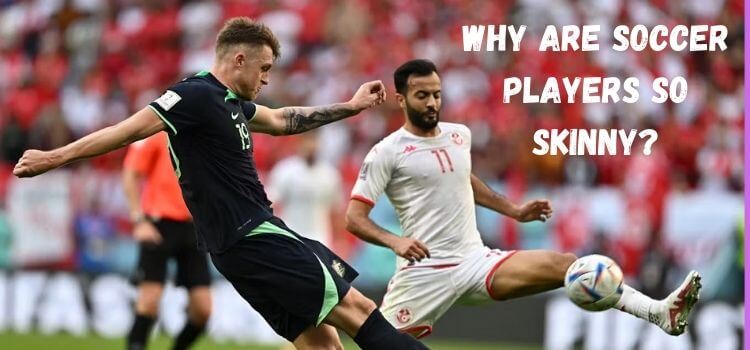As an Amazon Associate, I earn from qualifying purchases
Soccer, known as football in most parts of the world, is a sport that demands a unique combination of physical endurance, agility, and skill. One common observation among soccer players is their lean and slender physique, often raising the question: Why are soccer players so skinny?

Physiological Demands of Soccer
Soccer is characterized by constant movement across the field, with players covering large distances throughout the game. The sport also involves frequent bursts of high-intensity activity, such as sprinting, jumping, and rapid changes in direction.
In addition, soccer matches typically last 90 minutes, which requires players to maintain a high level of endurance.
Nutritional Factors
Because soccer is demanding, players are required to expend a lot of energy. As a result, nutrition plays a crucial role in supporting their performance and maintaining their physique.
Soccer players require carbohydrates for their intense physical activity, which is one reason why carbohydrates are their primary source of energy.
Additionally, lean protein is essential for muscle repair and recovery after strenuous training sessions and matches.
Training Regimen
Soccer players undergo rigorous training regimens to prepare for the physical demands of the sport.
Training often includes cardiovascular exercises to improve endurance, strength training to build muscle and power, and agility drills to enhance speed and agility on the field.
Flexibility exercises are also incorporated to reduce the risk of injury and improve overall performance.
Body Composition vs. Performance
While soccer players may appear skinny, their physique is optimized for performance on the field.
Players with lean muscle mass are more likely to be able to move quickly and efficiently across the field than those with bulky muscles.
Agility and speed are critical attributes in soccer, and excess body weight can hinder performance.
Genetic Predisposition
Genetics also determine a soccer player’s physique. Some individuals may naturally have a leaner build, making it easier for them to meet the sport’s physical demands.
However, genetics alone do not guarantee success in soccer, as skill, dedication, and hard work are equally important factors.
Role of Position
The physique of soccer players can vary depending on their position on the field. For example, forwards may have a slightly more muscular build to withstand physical challenges from defenders and capitalize on goal-scoring opportunities.
In contrast, midfielders and wingers may prioritize speed and endurance, requiring a leaner physique to cover large distances during a match.
Pressure to Maintain Weight
Soccer players often face pressure to maintain a certain weight and physique, both from external sources such as media and societal expectations and internal pressures from coaches and teams. While appearance may be necessary, overall health and performance are more critical.
Injury Prevention
Soccer players’ slender physiques can also offer benefits in terms of injury prevention. With less body mass to absorb impact forces, soccer players may be at a reduced risk of certain types of injuries, such as those related to collisions or falls.
Additionally, flexibility training reduces the likelihood of strains and sprains by improving joint mobility.
Conclusion
In conclusion, the skinny physique of soccer players is a result of the unique physiological demands of the sport, combined with factors such as nutrition, training regimen, genetics, and positional requirements. While soccer players may appear slender, their physique is optimized for agility, speed, and endurance on the field, allowing them to excel in one of the world’s most popular sports.
Frequently Asked Questions (FAQs)
While nutrition is crucial for performance, soccer players focus on balanced diets rather than strict regimes. They prioritize carbohydrates for energy and lean protein for muscle repair.
While a slender build offers advantages in terms of agility and speed, soccer players may be at a disadvantage in physical battles with larger opponents.
No, the physique of soccer players can vary based on factors such as genetics, position, and individual training regimens.
Yes, success in soccer is determined by a combination of skill, dedication, and hard work rather than physique alone.
Soccer players may face pressure from various sources to maintain a certain weight and physique, but it’s essential to prioritize health and performance over appearance alone.
Read Our More Articles
- How Tall is the Average Soccer Player? The Answer Surprise You!
- Why Are Soccer Players Short? A Closer Look
- Why Are Soccer Players So Attractive?
As an Amazon Associate, I earn from qualifying purchases


